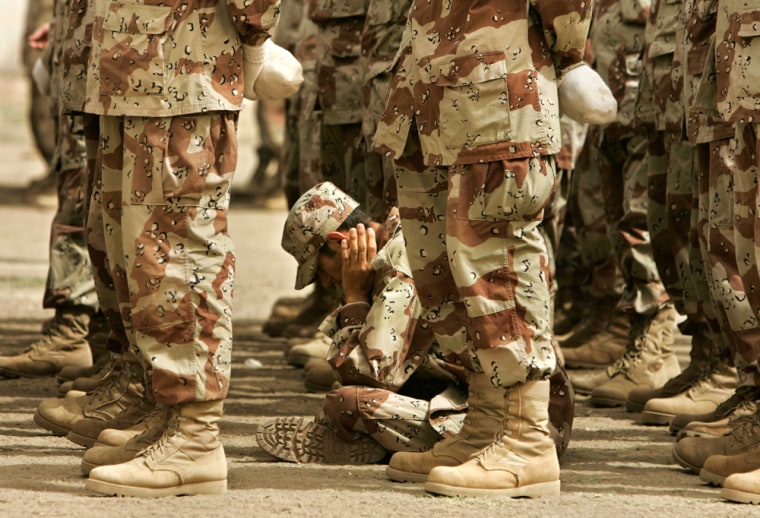Their televised graduation was supposed to be a moment of national celebration: A class of 1,000 Sunni Arab soldiers emerging from basic training would show Iraqis that the country’s worsening religious divide was not afflicting the national army.
Two months later, only about 300 of them have reported for duty, U.S. officials say.
The evaporation of the class underscores the struggling U.S. and Iraqi effort to increase recruitment from the disgruntled Sunni Arab minority, which forms the backbone of the insurgency.
The success or failure of the effort holds broad ramifications, especially as U.S. forces begin to hand control of troublesome Sunni cities and neighborhoods to Iraqi soldiers, most of whom are now Shiites and Kurds.
Unless more Sunnis join up, soldiers from one sect will increasingly target the hometowns of the other sects — without U.S. supervision.
“Units that are purely Shiite or Kurd or Sunni are looked on by various other sectors of the community as not being representative of their needs,” Gen. Peter Pace, chairman of the U.S. Joint Chiefs of Staff, said in an interview this year. “A unit that has all Iraqis embedded in it is better able to handle whatever kind of strife comes along.”
Huge recruiting effort
The 1,000 graduates were part of a program to recruit 6,500 Sunnis from the restive Anbar province. But with two classes of enlistees trained, only 530 soldiers have been added to the ranks, said Lt. Col. Mike Negard, a spokesman for the U.S. training command.
“The program is ongoing and its duration is based not on a timetable but to achieving the recruiting goal,” Negard said.
Though the Iraqi army does not track the religious affiliation of its soldiers, U.S. commanders acknowledge Iraq’s military lacks a proportionate number of Sunni troops. The effect of this imbalanced force has been unmistakable.
In Baghdad, civilians in Sunni Arab neighborhoods like Azamiyah and Dora have attacked Iraqi troops, thinking they were Shiite death squads that have slain hundreds of Sunnis. Such attacks have been rising in many parts of Iraq.
Key Sunni Arab leaders, such as Anbar Gov. Maamoun Sami Rashid al-Alwani, say people often complain about the behavior of Shiite troops. In Ramadi, Marines recently held public meetings where residents could scold soldiers who allegedly stole from homes or mistreated civilians.
Maamoun and other Sunni Arab politicians have long complained the government waited much too long to recruit from the Sunni heartland in western Iraq.
Recruiting stations targeting Sunnis were only added west of Fallujah in late 2005 or early this year — while tens of thousands of Shiites had been lining up to enlist in southern Iraq for a year and longer.
The Ministry of Defense blames persistent insurgent attacks in Anbar for the slow recruiting drive.
U.S. military at fault?
But some critics fault the U.S. military for not making recruitment in Anbar a priority sooner and complain it doesn’t track the religious makeup of soldiers.
“It’s a mistake not to track the sectarian makeup of the security forces. In fact it’s a big mistake,” said Michael O’Hanlon, a senior fellow of foreign policy studies at the Brookings Institution.
But he also said getting more Sunni Arabs to enlist carries problems, because of the possibility of insurgents infiltrating the army.
“If you bring too many Sunni Arabs into mixed units, you will set them (the units) up for ambushes, because filtering out insurgents is very hard and imperfect,” O’Hanlon said.
U.S. officials track the religious makeup of battalion commanders and above, but say the decision not to ask common soldiers about their religious background was left in Iraqi hands.
“That’s not for me to decide,” said Negard.
Not enough soldiers in general
Many U.S. commanders play down the importance of balancing the Iraqi army’s religious makeup, arguing the main problem is retaining troops who have already joined.
“It has nothing to do with them being Sunni or Shiite. It’s all about an army that doesn’t have a conscription program. They can leave whenever they want,” said Lt. Col. Mark Simpson, head of a U.S. team training an Iraqi army brigade that has only 70 percent of its authorized soldiers.
It’s a problem in many places, particularly Iraq’s unstable areas. Iraq’s 1st and 7th army divisions in Anbar should have about 10,000 soldiers, but U.S. officers acknowledge the units have only half that.
They haven’t given up on the Sunni class of 1,000, however.
“We’ve put out the message to get them back. We’ve asked city leaders to help get the message out,” said Marine 1st Lt. David Meadows. “It doesn’t mean they’re lost.”
